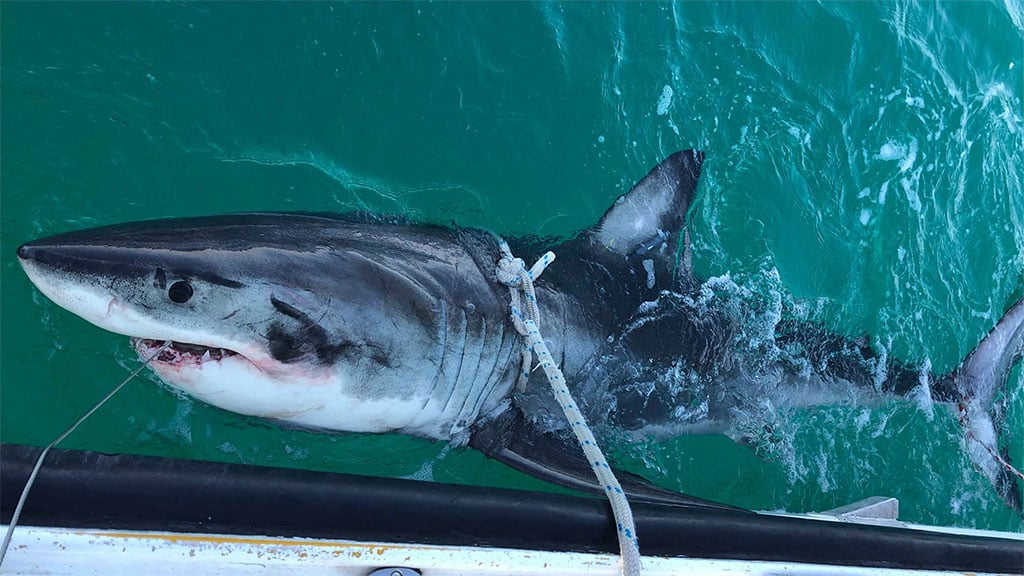Up close and personal with sharks: how a PhD is helping Zach live out his dream!
If you’re thinking about postgraduate study, you need to meet Zach ‘Dr Shark’ Clark – a PhD student at Deakin’s Centre for Integrative Ecology Genetics Laboratory – who’s living his dream as he works towards his next degree.
Zach shares his study journey, what his daily life as a shark researcher involves and why he thinks sharks are just like puppies!
 What is your PhD project about?
What is your PhD project about?
I’m researching the genetic ecology of great white sharks to understand their population structure, diet and movement patterns.
My day-to-day includes anything from swabbing live shark’s bums (a non-destructive sampling method to discover more about what they eat), spending lots of time in the lab running genetic samples and writing up my findings. I’m lucky to have a well-rounded project allowing me to do a bit of everything.
What inspired you to do a PhD?
I grew up by the ocean and always had a fascination with the environment around me. I was drawn to any water activity on offer, including surfing, diving and fishing. I’d go out in the boat with my dad most weekends, got my scuba ticket when I turned 14 and was just always in the water.
My journey to a PhD started eight years ago when I moved to Warrnambool to do a Bachelor of Marine Biology. I made my way into an honours degree and was inspired to move into the world of sharks.
Only five percent of the ocean has been explored, which means we know more about the surface of the moon. I was drawn in by the unknown of the marine environment, even though it’s right on our doorstep.
How is your PhD research making an impact?
I’ve been fortunate to work directly with NSW Department of Primary Industries, who lead the largest shark tagging program of its kind in the world.
Together, we’ve anal swabbed over 200 live great white sharks to understand and analyse their diet. We extract DNA from their poo and sequence it to make a taxonomic list of everything they’ve been eating.
It’s incredible being able to have a direct effect on management and conservation, fill in knowledge gaps and change people’s perceptions about sharks. Our team is helping to change the way we manage great white sharks in Australia.
Where do you hope your PhD will take you in the future?
I hope my research will help to challenge the way people see great white sharks and see the benefits of conserving and managing this incredible species.
Hopefully this will propel me into a career where I am working with sharks!
Three words to describe your PhD research?
Exciting, fun and challenging.
What’s the best part about studying at Deakin?
I love getting to work at the EcoGenetics Lab in Warrnambool. It’s a relatively small campus, which gives us a unique opportunity to work with lots of different environmental scientists over multiple disciplines.
It’s great to have the opportunity to work across a diverse range of projects – be it supporting terrestrial ecology in the Grampians and building wetland biodiversity across southwest Victoria to marine environments, including seaweed and sharks.
Can you recommend something you’ve been reading/watching/listening to?
I just watched a National Geographic documentary called SHARKFEST that I enjoyed. It shines a light on the science of sharks, highlighting the overstated fear driven by media to help understand the ocean’s most misunderstood predator.
What’s the most common question you’re asked about sharks?
I definitely get asked, ‘How do you anal swab a great white shark?’ the most. However, the answer isn’t that exciting – after shark capture and securing it on the boat, you just roll the shark over and swab its bum!
When you get sharks to the boat, they’re typically quite docile, just like puppy dogs. They’ll often lay there until you’re ready to release them back on their way.
Inspired by Zach’s story? Find out more about further study at Deakin – from scholarships to entry requirements.
